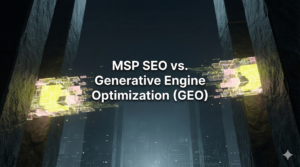If you’re scratching your head, wondering what’s better between SEO vs Google Ads to promote your website, you’ve landed in the right spot.
Picking one of the two can be overwhelming, especially if you’re just starting and you don’t know if you should play the long game, which is more cost-effective, or book a front-row seat in search results at a higher price. Both come with their pros and cons, so the battle between them rages on since there is no one right option; it is entirely subjective.
In this post, we’ll compare SEO vs Google Ads to explore whether you should stick to one or utilize both to your advantage.
Before we jump into the list, be sure to watch our insightful webinar on outranking industry giants with the help of SEO:
What Is SEO?
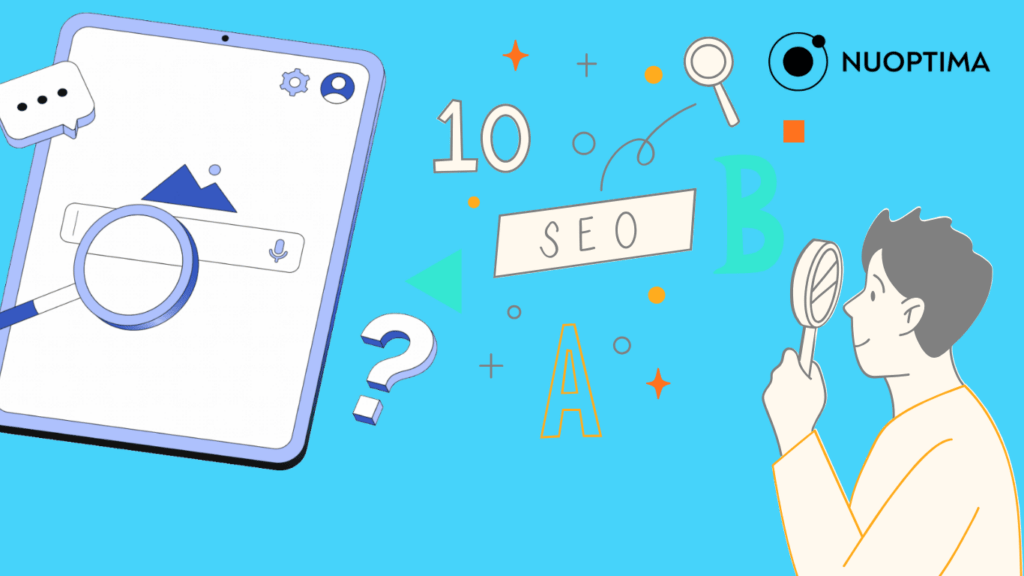
SEO, or search engine optimization, is an organic way of improving your website’s visibility in search engines like Google, Bing, and Yahoo. The better your website’s rank and authority, the more reach it receives across the world. However, for that to happen, you must have SEO strategies in place, which includes:
- Writing high-quality content;
- Performing keyword research;
- Following on-page and off-page practices;
- Creating backlinks from authoritative sources.
SEO works differently than Google Ads. It is more focused on the long-term growth of your website in the most organic way possible. It does not fetch instant results, but it is a more stable strategy for improving your position in search engine results pages (SERPs). To implement these strategies effectively and maximize your site’s potential, working with a reliable SEO agency can provide the expertise and guidance needed to ensure long-term success. If you are expanding your business to international markets, international SEO can be a vital tool to increase visibility and grow your audience globally.
Benefits of SEO for a Sustainable Online Presence
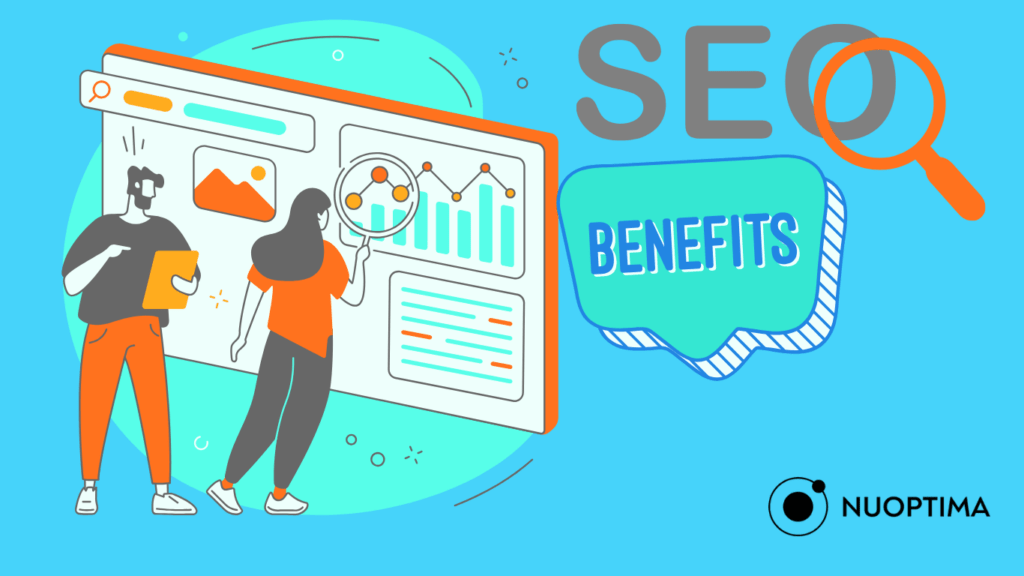
Proper SEO implementation has a positive, long-lasting, and profound impact on your brand. Let’s discuss some of its many benefits:
1. Boosts Visibility and Traffic
It goes without saying that when you ace the “SEO game,” your website starts to show up more on Google. Think of it like climbing a ladder — the higher you climb in its rankings, the more visibility you can enjoy.
Fortunately, more visibility means more people clicking through to your site—-resulting in better overall traffic. In fact, Backlinko reported that the top three Google search results receive 54.4% of all clicks, demonstrating how significant attaining a good SERP position can be. This increases your chances of smashing your end-user goals, whether selling a product, getting more email subscribers, or building a community of like-minded people.
2. Builds Trust and Credibility
Ranking high on search engines gives your site a stamp of approval and helps build trust. People trust their search engine, so they are more likely to trust you if you have a great position in its results. It’s like being recommended by a friend to whom everyone listens. This digital credibility is important in a world where trust can be hard to earn.
3. Improves User Experience (UX)
SEO also involves providing a better experience for your visitors because there’s more to SEO than merely showing up higher in SERPs. It’s also about improving your site for visitors, including a mobile-friendly design, content that answers their questions and pain points, and a responsive interface. Moreover, a fast page load time is essential in retaining your visitors; the longer the wait time, the more a user is willing to leave the site unchecked. [1]
This UX optimization means your site is more appealing and easy to navigate, increasing the chances of leaving a positive impression on prospective customers.
4. Gives You a Competitive Advantage
SEO can give you a fighting chance against your competitors if you’re just starting. For example, by conducting a competitor analysis, you can identify which keywords the top-ranking websites are targeting and then create higher-quality content around those keywords. Outdoing your competitors strategically in areas like this can drive more organic traffic to your website by improving your visibility on search engines.
You might not have their budget, but with the right SEO strategies, you can carve out your space in search rankings. It’s about being clever and strategic, making the most of your strengths to rank alongside or even above pre-established sites.
Introduction to Google Ads and Its Campaign Types
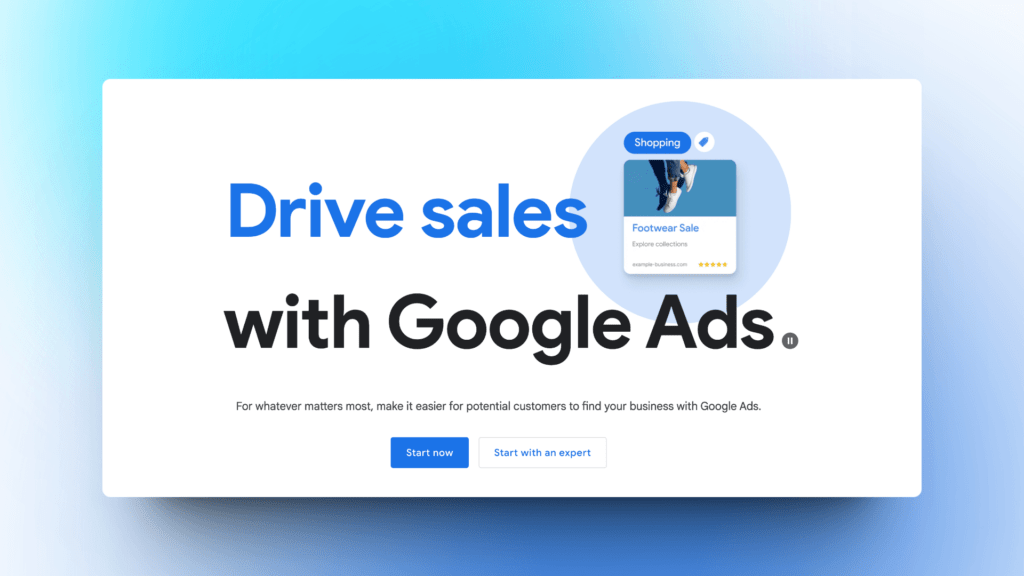
Google Ads (formerly known as Google Adwords) is one of the most prominent pay-per-click (PPC) advertising options online. It allows you to set a budget and instantly advertise to your target audience across various channels under Google and its partner websites, like YouTube.
Google Ads allows you to pay for your ads by clicks or impressions. The cost per click (CPC) depends upon several factors, so you must bid for keywords before you can place an ad for them.
It follows an auction system, where the ad’s position is determined by the bid amount and the ad’s quality score based on its relevance and expected click-through rate (CTR). You can also target ads based on multiple criteria, such as keywords, location, demographics, and user interests.
According to DemandSage, over 80% of companies use Google Ads for their PPC, demonstrating its vast popularity. This is mainly because it opens the door to a large audience that collectively makes over 8.5 billion daily searches – more than any other platform. [2]
Depending on your goals, you can opt for different campaigns, including:
1. Search Campaigns
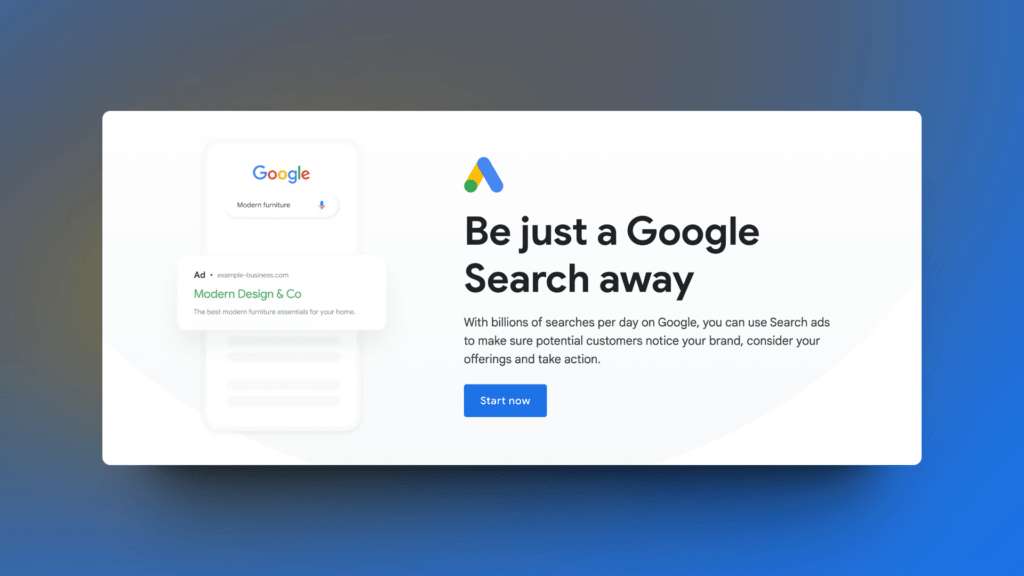
Search campaigns are text ads targeting people actively looking for what you offer. They help drive sales, generate leads, and increase website traffic. You can bid for relevant keywords and have your website show up at the top of SERPs when a user searches for those keywords.
It allows highly specific targeting with a minimal setup. Plus, they’re very subtle and might not even look like an ad most of the time because they blend in with the organic search results.
2. Display Campaigns
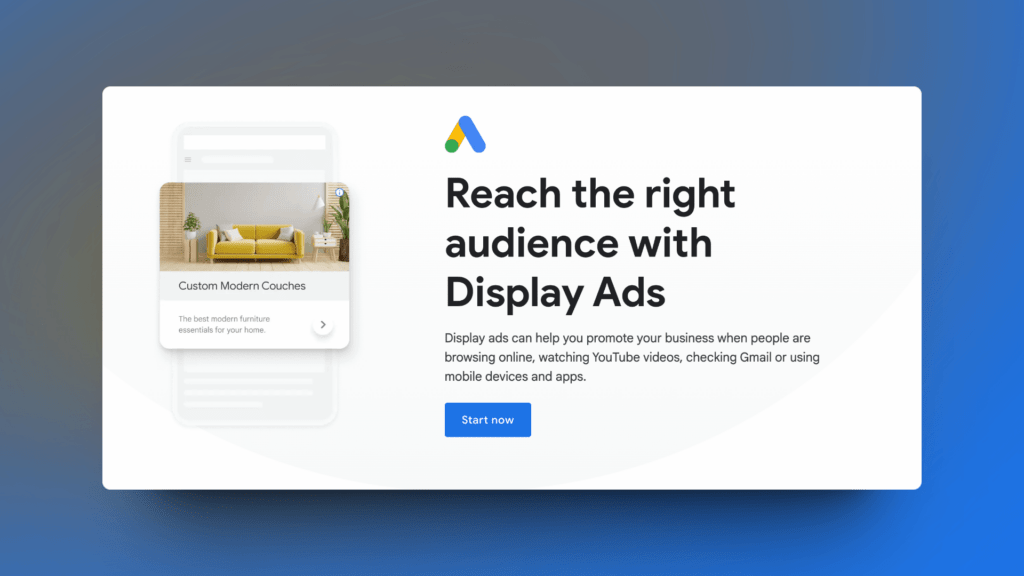
A Display campaign would be a great bet if your marketing goal is to get your brand’s name out there. They are image ads that can help you reach millions of people on the internet using different formats of ads across a massive library of websites and apps under Google’s network, such as YouTube and Gmail.
They’re great for driving sales and leads, creating awareness, and following up with people who’ve already visited your website in the past since the ads can reappear to the targeted audience until they take action.
3. Shopping Campaigns
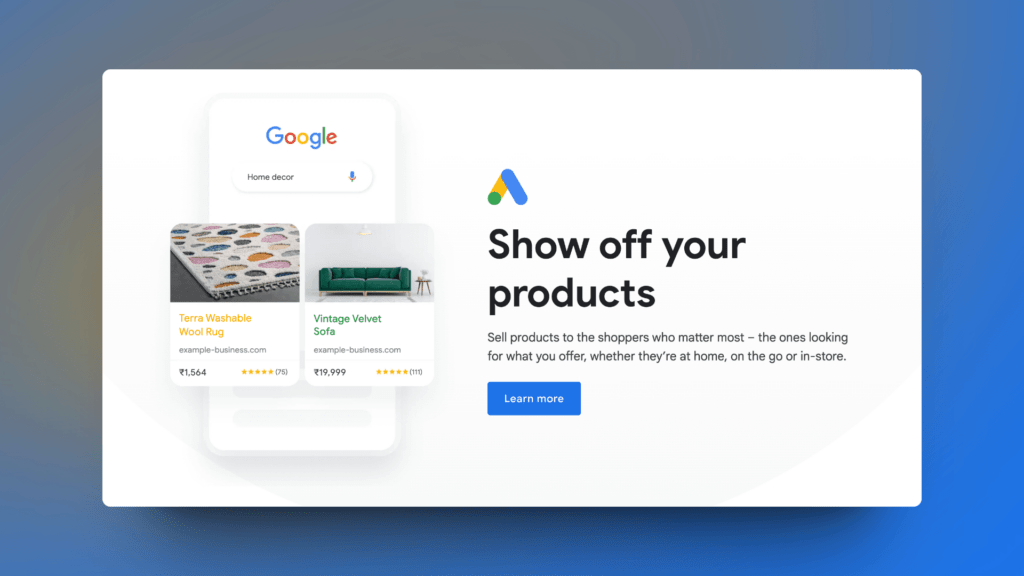
Shopping campaigns are designed to maximize return on investment (ROI) and are great for e-commerce businesses. They showcase the product directly in the search results within the Shopping tab and contain all the necessary details, like cost, image, and description.
These ads appear across Google properties and search partner search results, such as websites or blogs running Google AdSense. They are ideal for boosting your already-established online store sales or targeting customers willing to buy from your local storefront.
4. Video Campaigns
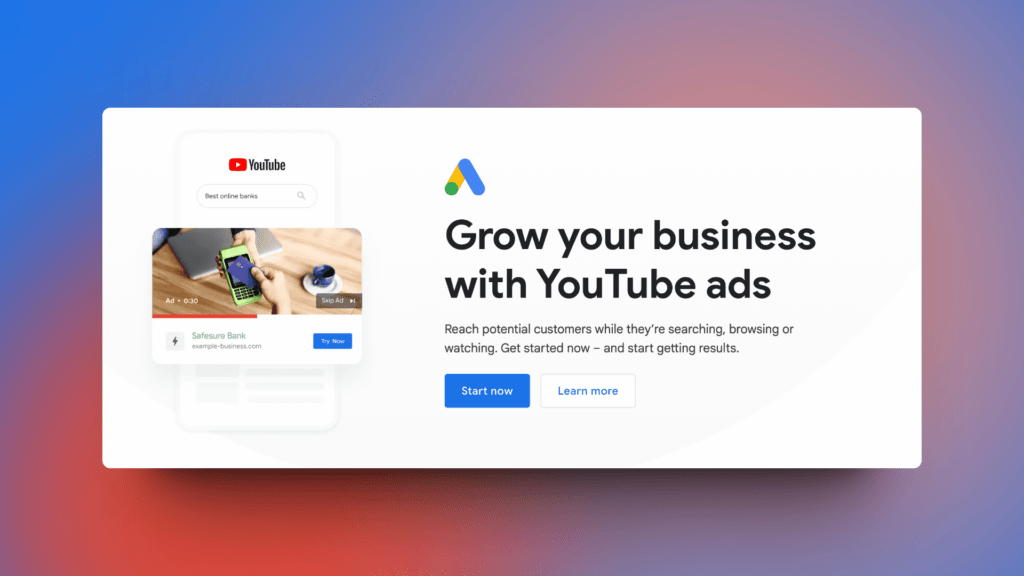
Most digital marketing campaigns are incomplete without an ad in the form of a video, as they tend to be much more engaging than just text. In fact, 98% of the viewers prefer watching videos to understand a service or product better. [3]
The video campaign in Google Ads allows you to promote your business within various areas of YouTube, such as videos, search feed, and homepage. These are the ads that appear before, during, or after the videos you watch on YouTube.
While they can be annoying to most users, they’re still great for boosting brand awareness, driving conversions, or getting people to visit your website, given that advertisers can reach over 2.5 billion users on YouTube[4].
5. App Campaigns
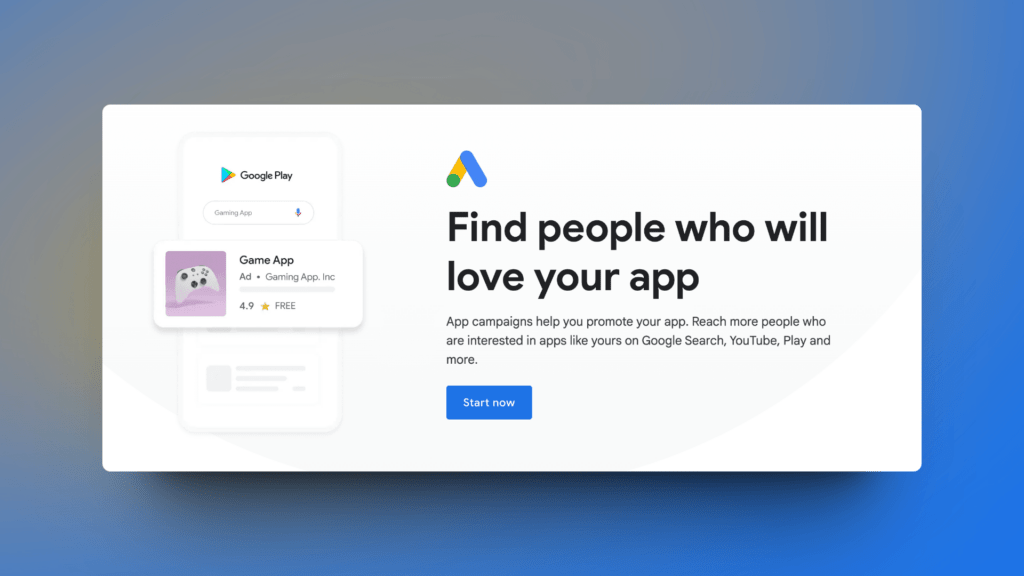
App campaigns help promote your app, get as many installations as possible, and increase in-app purchases. It utilizes AI-powered targeting, bidding, and ad creation for the best results. There are three types of this campaign:
- App Installs: To get people to download your app.
- App Engagement: To get existing users to take action in your app.
- App Pre-Registration: To promote pre-registration for apps before they are released on Google Play.
App campaigns appear on search results, Google Play, YouTube, Google Discover, and over three million sites and apps.
Benefits of Google Ads for a Quick Turnaround
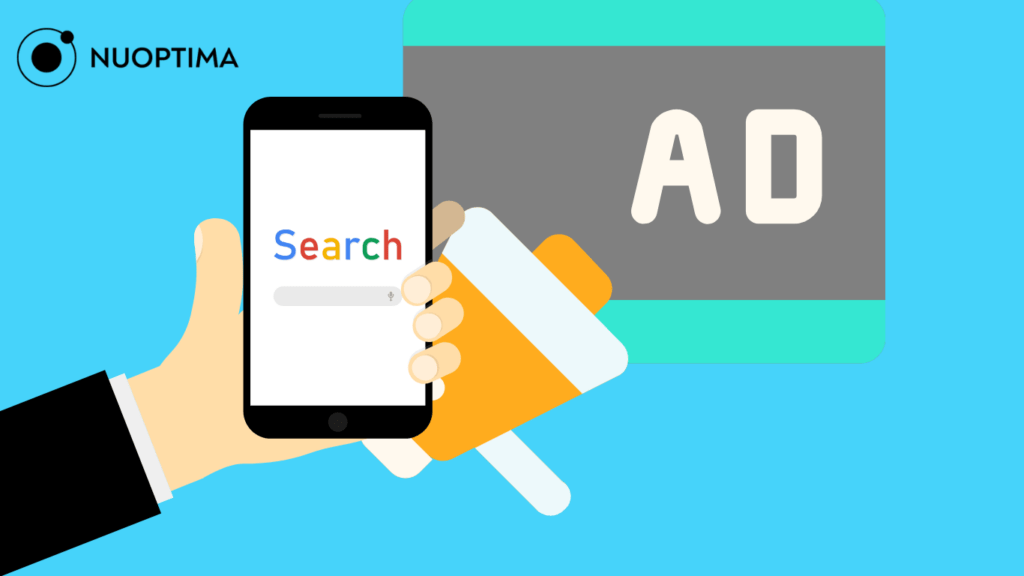
Google Ads has numerous benefits that are worth talking about, but here are some of the prominent ones:
1. Reach the Right People
Google Ads allows you to target specific audiences based on keywords, location, age, interests, and more, whereas you don’t have control over the same when running SEO campaigns. This means you can show your ads to the people most likely to be interested in your product or service, maximizing your chances of making a sale or getting a lead. Additionally, incorporating negative keywords into your Google Ads strategy further refines your targeting by excluding irrelevant searches, ensuring that your ads reach the most relevant audience. In an SEO vs Google Ads comparison, the latter takes the cake for better precision and active targeting.
2. Flexible and Scalable
With Google Ads, you have the flexibility to set and control your budget. You can start with a small budget and increase it as you see results. Moreover, you only pay when a certain action is completed. For example, you only have to pay when a user clicks on a search ad or your ad gets shown to a number of people on a display ad.
3. Measurable Results
With Google Ads, you get detailed insights and analytics on how your ads are performing. You can see which ads are driving traffic, which keywords are most effective, and how much each click is costing you. This data helps you fine-tune your campaigns for even better results.
While measuring results is also possible with SEO, it becomes all the more important with Google Ads since your results heavily depend on how much you spend on each campaign.
4. Fast Outcome
Unlike SEO, Google Ads can start driving traffic to your site almost immediately. You can quickly set up a campaign, make changes on the fly, and adapt your strategy based on real-time feedback. This ensures you’re getting straight to the meat without much guesswork.
SEO vs Google Ads: The Differences
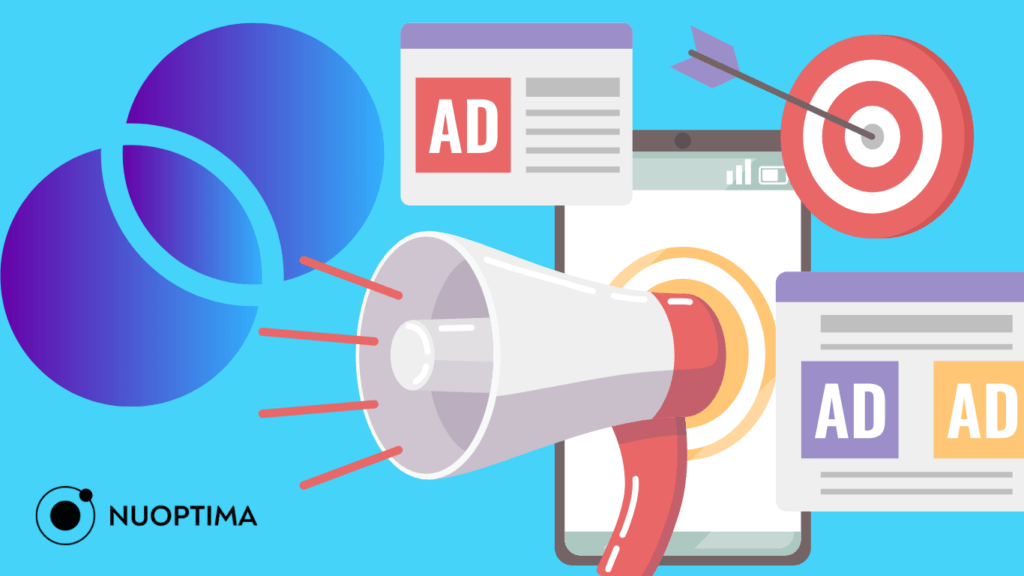
SEO and Google Ads are both effective in their own right and essentially achieve the same goal of attracting visitors and potential customers. However, there are several differences between the two. Let’s dive deep into the differences between SEO and Google Ads:
| SEO | Google Ads | |
| Traffic | SEO brings organic traffic to your website when you use relevant keywords, quality content creation, link building, and website optimization to improve SERP ranking. A good amount of traffic signifies that your ranking is climbing up the ladder, improving the overall domain authority. | There is no procedure for ranking up in the SERPs as you’re already at the top under the “ads” or “sponsored” section. That, paired with precise targeting, brings in a boom of traffic to your website. |
| Cost | If you have the required knowledge, skills, and time to follow SEO practices all by yourself, you’ll probably not spend any money. However, if you do not, you will likely need to hire an SEO expert or an agency to implement the best and most relevant techniques within your overall strategy. This will require some investment, depending on their fees. | Google Ads follows different costing options for every ad type. For example, Search ads have a Pay-Per-Click (PPC) model, where a cost is incurred every time a user clicks on your ad. The cost is calculated per click (CPC). On the other hand, a Display ad charges you in different ways, such as per 1,000 impressions, CPC, or Cost-Per-Acquisition (CPA), which is essentially the amount you pay when someone takes a specific action. So, a budget must be constantly allocated to ads to keep them active. |
| No. of Keywords | Aiming for a small collection of short-tail and long-tail keywords at a time can be ideal for your SEO strategy. A primary keyword followed by several secondary keywords should be enough to avoid stuffing. | There’s no limit on the number of keywords you should target through Google Ads. You can incorporate more or less depending on your preference. |
| Placement Control | You get less control over the exact placement in search results. SEO efforts aim to rank high organically, but exact positioning can vary based on search algorithms and competition. | You get complete control over ad placement for specific keywords and search queries. You can bid for top positions and adjust strategies as needed. |
| Results | SEO will get you the desired results if your brand aims for long-term growth, establishing credibility and trustworthiness in the industry, all while increasing visibility. The organic results come in slower, but they’re passive and don’t require constant spending. | The results you get from Google Ads are instant. The traffic quality and quantity depend upon your budget for ads and how optimized your campaign is. Results are almost guaranteed whether you aim to get traffic or generate sales. In fact, according to Google Economic Impact, it’s estimated that for every dollar a business spends on an ad, it generates eight dollars in profits. The only downside is that the results stop as soon as you stop paying for the ads – unlike SEO. |
This leads us to a very important question: When should we leverage SEO over Google Ads and vice versa? When comparing SEO vs Google Ads, there are scenarios where one option is better than the other.
If you want long-term growth, organic traffic, and credibility, focus on SEO. It’s perfect for businesses with limited budgets but willing to invest time and some capital for high-quality content. For quick results and instant traffic, use Google Ads. It’s one of the fastest ways to reach your target audience and get conversions.
Moreover, the budgeting aspect of considering between SEO vs Google Ads is a challenge unless you have a clear picture of your goals. You must set a prolonged budget for SEO, as it yields better results over time. On the other hand, it’s a good practice to set aside a portion of your overall budget for Google Ads to run campaigns when the need for promotion arises, such as when rolling out a new product or targeting holidays.
By consistently monitoring the performance of your ad campaigns and SEO results, you can judge the effectiveness of SEO vs Google Ads and allocate funds to the best channels accordingly.
Benefits of Combining SEO and Google Ads
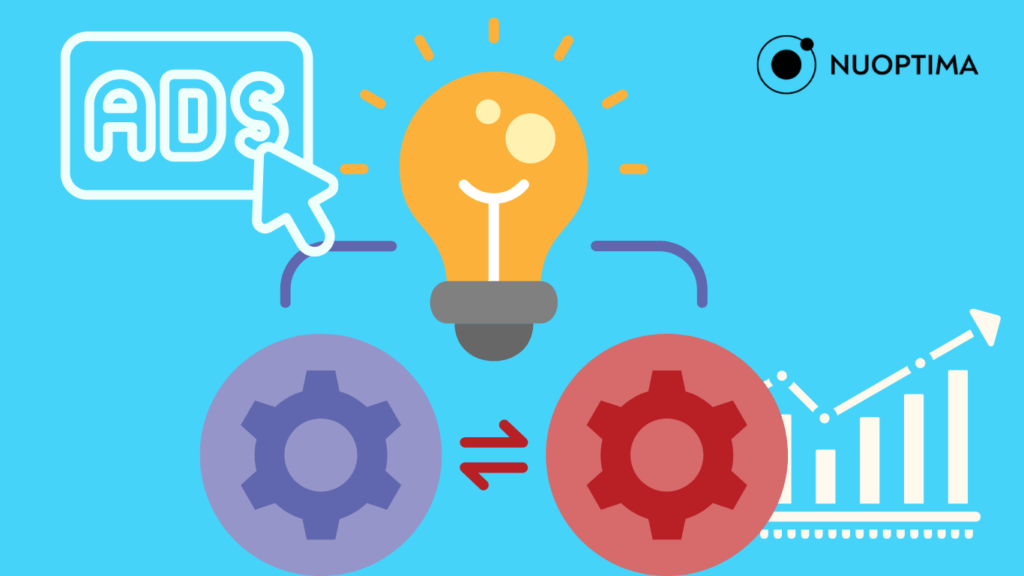
An effective digital marketing strategy uses the amazing synergy of SEO and Google Ads (instead of seeing it as SEO vs Google Ads), and both yield great results by filling in the gaps for each other. You can increase your website traffic and conversion rate exponentially by strategically utilizing both. Here’s how combining them can help you:
- Visibility: With SEO, you can improve your SERP ranking and gain organic traffic, while using Google Ads can give you instant visibility. Seeing a brand organically and via paid ads from the customer’s point of view enhances credibility and trustworthiness.
- Targeting Different Audiences: SEO vs Google Ads can target two different kinds of audiences. Google Ads can serve as the commercial force, targeting users who are likely to drive sales, whereas SEO can be used to provide educational and industry-relevant information.
- Keyword Analysis: Using Google Keyword Planner (the built-in tool for Google Ads), you can get valuable insights into keyword selection, which can be used to improve SEO. It’s like an arrow that can strike both ways.
One of the best examples of a brand using a combination of SEO and Google AdWords (now Google Ads) in its marketing strategy is Blue Apron [5]. This American company offers a meal-kit delivery service and follows a subscription-based model.

By understanding the difference between SEO vs Google Ads and the value both add to their digital marketing campaign, they applied a fusion of them. They figured out the kind of content most beneficial and relevant to their target audience and started pushing out blogs using the right keywords. These blogs covered recipes, tutorials, tips, and more to gain an organic flow of traffic from people interested in cooking. This covered the SEO side of things.
While that was a great long-term strategy, they also ran Google Ad campaigns to appear directly on top of SERPs and provide relevant information about their services, such as price, descriptions, and meal options. This way, they were able to advertise to their target audience and boost sales while continuing to improve their SEO.
Discover NUOPTIMA: Leading SEO and Google Ads Agency
An SEO agency can be a game changer if you lack the skills to create an effective strategy yourself. You might wonder why, and it’s because an SEO agency can become the architect of your digital visibility by optimizing your content for search engines, crafting a fail-proof strategy, and ensuring your business not only appears but shines in search results.
Fortunately, NUOPTIMA does all of this and more. Our experts are determined to create an online presence that’s built to last, grow, and evolve with your business. Over the years, we’ve helped numerous clients stay on top of the ever-changing search engine algorithms and gain consistent traffic, higher conversion rates, and, ultimately, a polished bottom line.
We offer on-page and off-page SEO services, such as:
- Performing an in-depth analysis of your website’s SEO performance
- Making your website responsive for all devices
- Building internal links throughout your website
- Conducting competitor analysis
- Researching profitable search terms with our keyword research services
- Creating and optimizing content for better performance
- Constantly reviewing, monitoring, and updating existing content
- Creating quality do-follow backlinks, thanks to our SaaS link-building agency
In addition, we also take pride in being a Google Ads agency that can help you acquire ready-to-buy customers every time you run a campaign. We follow an effective 3-step process to get you the desired results from Google Ads:
- Analyze your Google Analytics, Google Search Console, and PPC data to identify high-buying intent keywords;
- Set up Google Search, Shopping, and Remarketing to test the profitability of Google ad campaigns using broad match keywords, then refine into phrases and exact matches;
- Manually manage keyword bids to prevent overspending and set up full-funnel tracking to link clicks to ad spend and revenue.
One of our standout Google Ads clients is Icy Bear, a leading dental company specializing in teeth whitening products. When Icy Bear approached NUOPTIMA, their goal was clear: boost online sales through their website. We jumped right into action, starting with solid SEO foundations before moving to a Google Ads strategy.
Our campaign was laser-focused on two key metrics: maximizing ROI and slashing customer acquisition costs (CAC). And the results speak for themselves: 63.7K clicks, 4.63K conversions, and a whopping £165k in total revenue. That’s a 13X return on ad spend (ROAS) and an average ROI of 10X.
How did we pull this off? We stuck to a few basic PPC principles:
- Careful Ad Performance Monitoring: We kept a close eye on every metric that mattered, tweaking and optimizing for peak performance;
- Creative Ad Copy: Our team crafted compelling ad copy that grabbed attention and drove clicks;
- Seamless Website Optimization: Ensured the user journey from ad click to purchase was smooth, fast, and hassle-free.
We turned Icy Bear’s aspirations into impressive results by sticking to these principles. We can help you achieve something similar (or better). Let our experts do what they do best so you can focus on more important things. Book a free discovery call to explore how we can deliver incredible results for your website and business.
Closing Thoughts
Choosing between SEO vs Google Ads boils down to your business needs and goals. On one hand, SEO helps you with long-term growth and sustainable online presence, but it may take some time before effects can be seen.
Google Ads, on the other hand, immediately provides you with visibility and is good for short-term campaigns and quick targeting of audiences. Seeing it as “SEO and Google Ads” instead of “SEO vs Google Ads” would be much better for maximizing reach.
Fortunately, you don’t have to do all the work yourself when you let NUOPTIMA take care of it for you. Get in touch today to start right away!
FAQ
Prioritizing SEO vs Google Ads depends upon your business’s goals. SEO is the way to go for long-term and sustainable growth. If budget isn’t a constraint and you want instant visibility and precise targeting, Google Ads are your best bet.
Absolutely! When considering SEO vs Google Ads, a fusion of the two can be utilized to achieve strong results. It can get you both organic and targeted web traffic.
Picking one from SEO vs Google Ads would depend entirely on your budget and how much time you will spend. SEO will be preferable if you have plenty of time (a few months on average) but are on a budget and wish to build organic traffic. However, if a decent sum of your budget can be allocated towards ads, Google Ads will fetch you amazing results.
References
- https://www.statista.com/statistics/276115/user-patience-with-website-loading-speeds-on-mobile-phones/[1]
- https://www.statista.com/topics/1710/search-engine-usage/#topicOverview[2]
- https://www.g2.com/articles/video-marketing-statistics[3]
- https://datareportal.com/essential-youtube-stats[4]
- https://www.marketingstrategy.com/marketing-strategy-studies/blue-apron-marketing-strategy/[5]

